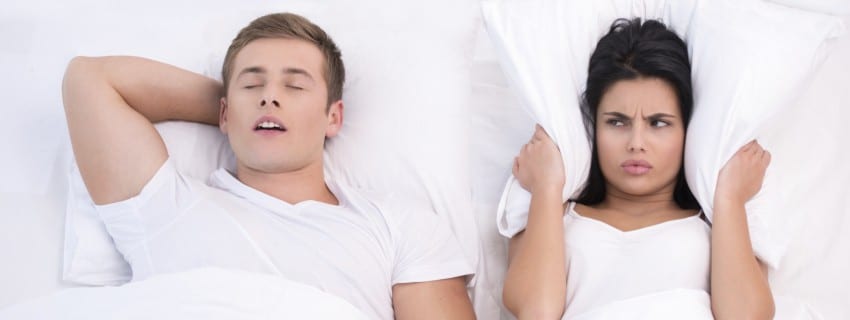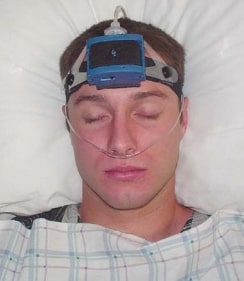
Making a Sleep Apnea Diagnosis
Diagnosing sleep apnea isn’t always easy. Some people suffering from sleep apnea don’t even know they have it. They may find themselves feeling excessively groggy in the morning, even though they spent eight or more hours in bed. They may also feel tired throughout the day, doze off at inopportune times, and need to consume caffeine to stay awake.
The classic hallmark signs of sleep apnea include loud snoring with gasping, morning headaches, and repeatedly waking throughout the night. However, even when individuals realize there is something wrong, they aren’t able to undergo a traditional sleep study in a sleep lab. It’s not uncommon for sleep apnea patients to develop insomnia in a sleep lab. Whether it’s being in an unfamiliar setting or being uncomfortable due to all of the wires and electrodes, in-house sleep studies aren’t always effective.
What is a Home Sleep Study?
An at-home sleep study is one type of polysomnography, a test that evaluates a patient to diagnose obstructive sleep apnea. Traditionally, polysomnography had to be performed in a sleep lab to gather the appropriate data for making a sleep apnea diagnosis. Today, patients have a much more convenient option known as a home sleep study or home polysomnography. This test allows patients to be tested from the comfort of their own bed. If you’re worried about not being able to fall asleep during an in-lab sleep study, a home sleep study may be better for you.
At-home sleep studies are usually more comfortable than ones performed in a sleep lab. Patients are able to sleep in their own beds, which makes falling asleep easier. At-home sleep studies also require fewer wires and electrodes. In most cases, patients only need to apply three to four electrodes on their chest and a pulse oximeter on their finger to monitor their oxygen levels.
If you are exhibiting symptoms of obstructive sleep apnea such as excessive daytime sleepiness, chronic snoring, or even just chronic fatigue and feeling tired often, Dr. Marc Bowen may recommend that you undergo a home sleep study in order to accurately diagnose your condition. Our NYC pulmonology practice is dedicated to patient convenience and accessibility, offering the latest diagnostic tests and procedures to diagnose the cause of your breathing problems and help you find relief. Schedule an appointment with our board-certified sleep specialists or call 212-480-4062 for help today. Appointments will be confirmed by office staff.
How a Home Sleep Study Works

With a home sleep study, you’ll be provided with a small device and simple instructions. You will take the device home and follow the steps for performing the sleep study before you get ready for bed. The at-home sleep study technology involves wearing a compact device around your head as you sleep, which will collect important data about your vital signs – such as pulse, blood oxygen levels, and breathing patterns. After your test, you will return the sleep study device to Dr. Bowen so he can interpret your results and make a diagnosis.
Why Should I Have A Home Sleep Test (HST)?
You may benefit from a sleep study if you show signs of sleep apnea. This common sleep disorder presents numerous risks to your health and well-being. When appropriate, Dr. Bowen prescribes home sleep tests as an alternative to a night in a sleep lab. Provided that you do not have concurrent conditions, such as restless leg syndrome, a home sleep test may be ideal for measuring your breathing while you sleep. This test is appealing because it is convenient, reliable, and comfortable. You may sleep better overall by conducting the test in the comfort of your own bedroom, enabling the test to capture relevant information regarding potential sleep apnea.
How Do I Use The Home Sleep Test Device?
The sleep test device that you pick up from our office or specialty store will come with concise instructions for use. These devices are made to be easy and comfortable. As you prepare to go to sleep, you will apply various features of your sleep device to parts of your body. These may include:
- A pulse oximeter that fits over a fingertip. This measures the level of oxygen in your blood.
- A breathing sensor that sits at the opening of the nostrils. The tiny tubing wraps around your ears to keep it in place as it measures your breathing pattern.
- An effort belt, which straps comfortably around your chest or abdomen to record movement that indicates the effort it takes to breathe.
- Your device may also simply include a comfortable headpiece that slips around the crown of your head. This compact device collects multiple measurements while you sleep.
What Time Should I Go To Bed?
While undergoing your at-home sleep test, you will go to sleep and wake up as you normally do. This enables the device to gather the most accurate and organic information. The doctor may advise you to avoid caffeine and alcohol consumption during your test period, which may occur over multiple nights.
When Will I Get The Results Of My Home Sleep Test?
When your test is complete, you return the unit to our office or other determined location. The data collected on the device is downloaded and carefully analyzed. This process can take up to two weeks. You can expect to receive the results of your test 10 to 14 days after you have returned your study device.
What Happens After My Home Sleep Test?
After your home sleep test, you will return the device as instructed by Dr. Bowen. You need not do anything extraordinary after your test is done. The doctor will review the findings and, if you exhibit signs of sleep apnea, will discuss treatment options or further testing as needed to fully understand the extent of apnea you have and how it may affect your life if not properly treated.
What Happens If I Leave My Sleep Apnea Untreated?
To preserve health and wellness, it is imperative to get to the source of sleep apnea symptoms. It is not normal and healthy to feel exhausted every day or to wake up every morning with a headache. Every time respiration stops while you sleep, your body releases adrenaline to rouse you. Adrenaline increases heart rate and blood pressure, which can eventually contribute to cardiovascular risks. Studies also indicate that sleep apnea negatively affects metabolic health, increasing one's risk of diabetes regardless of their weight. Having untreated sleep apnea puts you at risk of heart attack, stroke, anxiety, depression, and lessened quality of life. There is also a very real risk of shortening your lifespan by years if you do not receive adequate care for sleep apnea.
What Are the Advantages of an at-home Sleep Study for Sleep Apnea?
- Performed from the comfort and convenience of your own bed
- Eliminates the need to spend the night at a hospital or sleep lab
- Produces accurate results with quick turnaround in order to make a sleep apnea diagnosis
- Cost-effective testing option
- Provides a better profile of the patient’s breathing during sleep in his or her normal environment
In certain cases, a home polysomnography may not be the best option and an in-lab sleep study may be recommended instead. This may be the case if another sleep disorder in addition to obstructive sleep apnea is suspected (e.g. restless legs syndrome) or if you have other health problems that warrant a more involved diagnostic test.
Patient Testimonial
"Dr. Bowen is very thorough and attentive. He truly cares about your well being. He is very detail oriented and makes certain that you understand your diagnosis and treatment plan."
Click here to read more reviews.
What to Expect After Undergoing a Home Sleep Study for Sleep Apnea
After undergoing at-home sleep apnea testing, Dr. Bowen will be able to interpret the data provided by your polysomnogram and make a diagnosis. If the results indicate the presence of obstructive sleep apnea, Dr. Bowen will prescribe treatment and explain the next steps to follow in order to achieve the restful and restorative sleep that you deserve.
Get the Sleep You Deserve
If you suspect that you may suffer from obstructive sleep apnea or if you are interested in learning more about a home sleep study, please contact our office at 212-480-4062 to schedule an evaluation.
